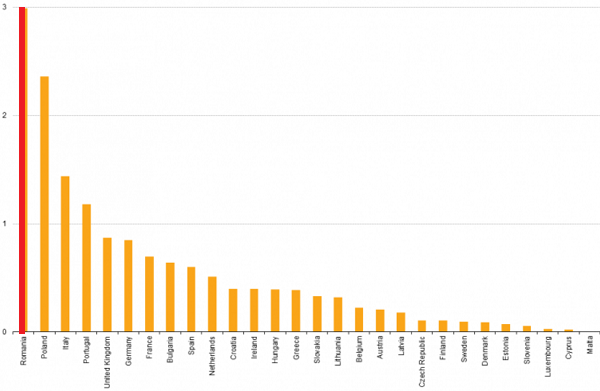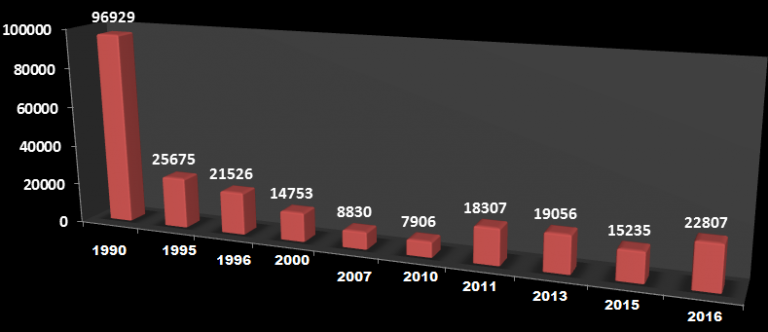 The latest official data close to reality shows that on January 1, 2016, there were almost three million Romanians who were residents in another member state.
The latest official data close to reality shows that on January 1, 2016, there were almost three million Romanians who were residents in another member state.
The figure is provided by Eurostat and was calculated based on the information received from the statistical offices of the other 27 member states.
 We hold the EU record, at a big distance from Poland, which has produced less than 2.5 million emigrants to a population of nearly 38 million people.
We hold the EU record, at a big distance from Poland, which has produced less than 2.5 million emigrants to a population of nearly 38 million people.
The largest Romanian communities, according to the latest Eurostat data, are in:
- Italy – 1.151 million
- Spain – almost 700,000
- Germany – almost 450,000
On the other hand, in the last years, the INS data revolve around the same long overdue threshold – 2.5 million Romanians left abroad. Specifically, on January 1, 2016, the INS data showed that the number was 2,500,484 persons.
The chaos from the domestic statistics and the lack of surveys on Romanian communities from abroad reflect the governors’ lack of interest in this phenomenon that led to the worst demographic crisis in Romania.
That, in a context when all indicators in the field show that the phenomenon returns to the alarming proportions registered before the crisis.
With a mention: the trend is even more worrying when it comes to Romanians settling forever abroad.
Increase in the emigration of more than 12 months: Massive outflow of the workforce under the age of 30
In 2016, 207,578 Romanians went to work for more than 12 months, compared to 194,718 in 2015.
This represents a return to the moment when the global financial crisis wiped out more jobs in the countries that were Romanians’ destination and tempered the departures – when the number of emigrants collapsed from nearly 250,000 in 2009 to 197,985 in 2010.
The highest increases are seen in the category of young people aged between 25 and 30: from 29,057 persons in 2010 to 47,756 persons (in 2015) and 35,224 in (2016).
Only in 2015, over 40,000 Romanians have taken another citizenship or emigrated definitively
Despite the lack of more detailed local data on migration, there is the possibility of an approximation regarding the people who settle abroad, by mixing two indicators, from different sources:
- the number of Romanians who obtain the citizenship in another member state (Eurostat data)
- the number of permanent emigrants (INS collects from the Minister of Internal Affairs, the Passport Service unit, the information on emigrations that include the change of residence – that is, these people have their main home, in their documents, abroad).
For both categories, we can assume that they have already built a stable life where they are.
Latest data on both indicators is available in 2015 and shows:
- 28,400 citizenships obtained by Romanians in another member state
- another 15,235 Romanians in 2015 were definitive emigrants (renounced their residence in Romania and settled on the territory of another state).
The total shows that 43,635 Romanians were in one of the two situations.
Of them, we should deduce the 2,600 Romanians who have obtained the Hungarian citizenship, but we do not know how many really move to the neighbouring country.
Data for 2016 will exceed the threshold of 50,000 people and both indicators are on an upward trend.
Shocking figures: 29% of EU28 citizens who have changed their citizenship are Romanians
Information on new citizenships in the EU for 2016 will only be available in the second half of this year, but we already have the figures on the definitive emigrants – the number is approaching the peak period: 22,807 Romanians who have changed their residence on paper, about 50% more than in 2015.
This is the largest number registered after the EU accession and a level that has not been reached since 1995:
 Regarding the citizenships, in 2015, 727,200 people from non-EU countries and 104,900 people from the 28 member states received the citizenship in an EU state. Out of the 104,000 people, 28,400 were Romanians.
Regarding the citizenships, in 2015, 727,200 people from non-EU countries and 104,900 people from the 28 member states received the citizenship in an EU state. Out of the 104,000 people, 28,400 were Romanians.
In absolute terms, Romanians were the main group of Europeans who obtained the citizenship of another EU member state.
In Italy, the number of citizenships granted to Romanians increased from 6,400 in 2014 to 14,400 Romanians in 2015.








